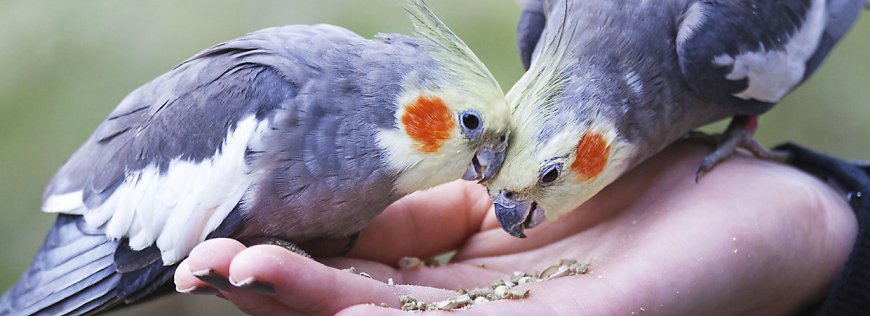A Guide to Caring for your Bird Companion
Birds make wonderful pets as long as they are under the proper care. They bring companionship, and vibrant energy into ... Read more

Birds make wonderful pets as long as they are under the proper care. They bring companionship, and vibrant energy into our lives.
Whether you’re a seasoned bird enthusiast or considering bringing a feathered friend into your home for the first time, understanding the different types of pet birds and their care requirements is important.
In this guide, we’ll explore popular types of pet birds, with a special focus on budgerigars, commonly known as budgies, and provide valuable tips for their care.
Popular Types of Pet Birds
Budgerigars: Budgerigars, or budgies as they are fondly known, are among the most popular pet birds in the world. However, keeping budgies as pets requires you as the owner to provide the correct conditions for them to live their best lives.
Originating from Australia, these small parrots are highly sociable and easy to tame. With their playful personalities, striking colors, and ability to mimic sounds, budgies make delightful companions for bird lovers of all ages. These small parrots are relatively easy to care for and thrive in spacious cages with plenty of toys for mental stimulation.
Cockatiels: Cockatiels are beloved for their friendly demeanor, intelligence, and charming whistling abilities. These medium-sized parrots are also native to Australia and are known for their distinctive crest and colorful markings. Cockatiels enjoy social interaction and may bond closely with their human companions. They benefit from daily handling and out-of-cage time to stretch their wings and explore.
Lovebirds: Lovebirds are aptly named for their strong pair-bonding behavior and affectionate nature. These small parrots come in a variety of colors and are known for their playful antics and vocalizations. Lovebirds thrive in pairs or small groups and require ample space to fly and exercise.
Parrots: The parrot family includes a wide range of birds that can be kept as pets, from the famed African Grey to the colorful macaws and loveable conures. Parrots are highly intelligent and can be taught to perform various tricks and mimic sounds, including extensive vocabularies.
African Grey Parrots in particular, are renowned for their exceptional intelligence and ability to mimic human speech with astounding accuracy. While they require more specialized care and attention compared to smaller bird species, African Greys form deep bonds with their owners and thrive on mental stimulation through interactive toys and training exercises.
Canaries: Known for their singing, canaries are a historically popular pet. These small birds are relatively easy to care for and are often more independent than parrots. They do not require social interaction to the extent that parrots do, making them a good choice for those who want a less demanding pet.
Finches: Finches are another great option for those who prefer a bird that requires less interactive care. They are tiny and energetic, and they do well in pairs or small groups. Their care is primarily focused on maintaining a clean environment and providing them with opportunities for flight within a suitably sized cage.
Specific Care Requirements for Pet Birds
Caring for birds requires understanding their specific needs, which can vary widely depending on the species. Below are some general guidelines:
Cage Size and Placement: The cage should be large enough for the bird to fly and move comfortably. For social species like budgies and cockatiels, a larger space is necessary, especially if keeping more than one.
The cage should be placed in a part of the home where there is family activity, but away from direct sunlight and drafts. Avoid cages with toxic materials such as zinc, and regularly clean and sanitize the cage to prevent the spread of bacteria and parasites.
Diet: A well-balanced diet is crucial for keeping birds healthy. While many birds thrive on a diet of pellets supplemented with fruits, vegetables, and occasional treats, specific dietary needs can vary.
For instance, canaries and finches do well on a seed-based diet, whereas parrots need a more varied diet. Ensure access to clean, fresh water at all times.
Social Interaction: Birds are social creatures and require interaction either with their human family or bird companions. This is especially true for parrots and cockatiels, which can become depressed if left alone frequently. Spend quality time interacting with your bird through gentle handling, training sessions, and supervised out-of-cage playtime.
Health Care: Regular check-ups with a specialized avian veterinarian are important to ensure that your bird is healthy and address any concerns promptly. Birds often hide signs of illness, so close observation for any changes in behavior or appearance is extremely important. Stay up-to-date on vaccinations and parasite prevention measures.
Enrichment: Birds need mental stimulation to stay healthy and happy. This can be provided through interactive toys, puzzles, and enrichment activities. Rotate toys regularly to prevent boredom and encourage exploration. Provide natural perches and other safe items to chew on.
By understanding the specific needs of different bird species and providing attentive care, you can provide a happy and fulfilling life for your feathered friend. Whether you’re drawn to the playfulness of budgies or the intelligence of African Grey Parrots, the bond you form with a bird can be truly special when you make sure to create the right environment and relationship.
Each species has its specific needs, so it’s important to choose one that fits well with your lifestyle and capabilities in terms of care. By understanding and meeting these needs, you can ensure a happy and healthy life for your feathered friend.










































